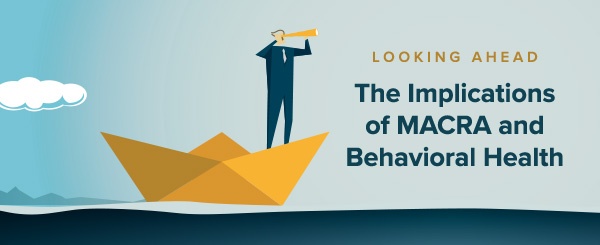The Implications of MACRA and Behavioral Health
by Core Solutions on November 28, 2016

As behavioral health organizations and healthcare agencies look ahead to the next five to ten years, the Medicare Access and CHIP Reauthorization Act of 2015 (MACRA) will present the biggest change – and opportunity, to traditional payment models that the healthcare landscape has experienced in decades.
The largest impacts of MACRA include eliminating the sustainable growth rate formula that has proven no longer effective, setting the stage for MIPS and APMs which are still within the legislative process and forcing the U.S. to better understand and manage costs. The other major opportunity of MACRA includes laying the framework for rewarding quality care. In fact, goals for 2016 include 50% of payments going through alternative payment methods and 85% of fee-for-service payments being tied to quality metrics. Finally, MACRA also presents a positive opportunity to combine quality reporting.
For BH organizations specifically, MACRA presents three major – and fairly early stage, implications:
- Clinical Practice Improvement
As the Federal Government continues to recognize BH as an increasingly important and prominent sector, MACRA has set forth new and specific incentives for organizations paid through Medicare. Goals set forth by MACRA include achieving health equality for underserved populations such as people with BH conditions and disabilities, as well as integrating primary care with BH providers. - Accountable Care Organizations (ACOs) Encouraged Use of BH
Currently, 70% of ACOs maintain some component of BH, but only 14% of that number is actually doing anything about it. So while these organizations are still in the early stages of leveraging the full capabilities that BH has to offer, MACRA sets the stage for ACOs to capitalize on this opportunity. - Importance of Patient Centered Medical Homes (PCMHs)
This implication promotes coordinated care, offering a lot of potential to streamline processes. According to CMS, 2015 demonstrated improvement in anti-depression medication management over the results in 2014. Furthermore, in the area of hospitalization for mental illness from a study conducted over the last five years, there is not enough being done. So while PCMHs are still in the very early stages with minimal metrics, MACRA feels this will be a huge opportunity in the future.
- April 2024 (3)
- March 2024 (4)
- February 2024 (1)
- October 2023 (3)
- September 2023 (3)
- August 2023 (2)
- June 2023 (2)
- May 2023 (3)
- April 2023 (4)
- March 2023 (2)
- November 2022 (3)
- October 2022 (1)
- September 2022 (1)
- August 2022 (3)
- July 2022 (1)
- June 2022 (1)
- January 2022 (2)
- December 2021 (1)
- October 2021 (2)
- September 2021 (2)
- August 2021 (2)
- July 2021 (5)
- June 2021 (5)
- March 2021 (2)
- January 2020 (3)
- November 2019 (3)
- October 2019 (2)
- July 2019 (1)
- June 2019 (1)
- May 2019 (1)
- April 2019 (3)
- October 2018 (1)
- September 2018 (1)
- August 2018 (1)
- July 2018 (1)
- June 2018 (1)
- May 2018 (2)
- April 2018 (1)
- March 2018 (1)
- December 2017 (1)
- October 2017 (2)
- September 2017 (1)
- June 2017 (2)
- May 2017 (2)
- April 2017 (1)
- February 2017 (2)
- January 2017 (3)
- November 2016 (2)
- October 2016 (3)
- September 2016 (2)
- August 2016 (1)
- July 2016 (2)
- June 2016 (1)
- May 2016 (3)
- April 2016 (2)
- March 2016 (2)
- February 2016 (2)
- January 2016 (3)
- December 2015 (2)
- November 2015 (4)
- October 2015 (3)
- September 2015 (4)
- August 2015 (1)

